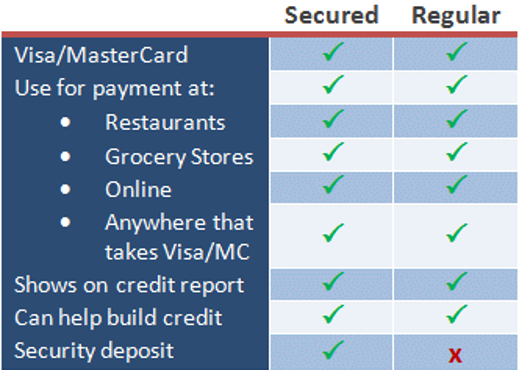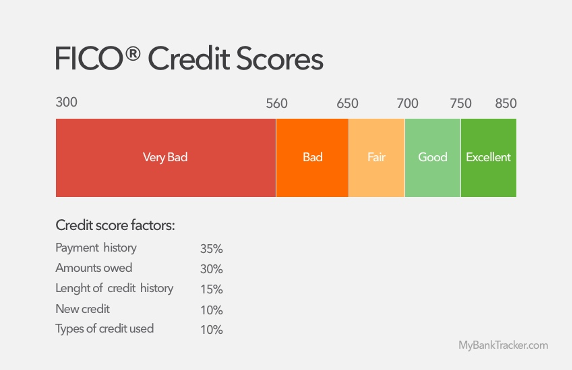How to Get A
Secured Credit Card With Poor Credit History
Secured credit cards are designed for
those who have poor or nonexistent credit history who are looking to build
their credit and eventually upgrade to better
credit cards.
Because these cards are typically given
out to those with a low credit score who may not be approved for more
mainstream credit cards, a form of collateral is needed for acceptance.
Most of the time, this collateral is
simply a security deposit to ensure the card provider. The amount of the
deposit typically determines the credit line that is approved and can range
from $200 to $500. The deposit is required in case you ever forget to pay off a
monthly bill, which will then be covered by a portion (or all) of your deposit.
The following infographic from CreditOne bank
displays the differences between secured and standard credit cards:

In this short guide, we’ll be discussing
the steps needed to acquire a secured credit card, our top recommendations, and
potential alternatives.
How to get A
Secured Credit Card
While secured cards are typically easily
accessible for those with a low or nonexistent credit score, it doesn’t mean
that everyone is approved for one.
Who
Gets Approved?
One of the first things that the issuer
will do when you’ve inquired for a secured credit card is analyze your credit
report and check for any signs that may show you are an unacceptable credit
risk, and therefore not eligible for a secured card. For example, possible
signs could include too many open accounts, a recent file for bankruptcy, or if
you’re far behind on other accounts.
Additionally, proof of income is
typically required in order to prove that you’ll be able to pay off the monthly
bills. Your deposit is there for insurance in case you occasionally slip up,
however, this is only used by issuers in a very resort scenario. Your income is
the expected channel of paying off the bills, therefore in most cases, it’s
required to be proven.
It’s also important to keep in mind that
all secured credit card issuers are different, so it’s essential to do adequate
research on each one and determine you have the right qualifications and income
to be accepted.
The following infographic from MyBankTracker show’s the difference between credit scores as well as what
impacts it. This is a great reference when determining your own credit health
and strategizing a plan to build it up.

The
Process
The actual process for applying and
acquiring a secured credit card is pretty similar to the process for standard
cards. However, each step is important to follow correctly as you’re trying to
build your credit score back up or from the ground up, which has risks of its
own.
1.
Application
The application process itself is
typically very straight forward. You apply for the card directly from the
issuer, and then it’s their time to evaluate the risk of accepting your request
based on the factors mentioned above.
If you check off the qualification boxes,
then congratulations! You’re approved.
2.
Fund Deposit
After approval, the next step is
submitting your initial deposit. Most issuers won’t open your account until
this deposit is secured. Bank account information is required in some cases to
allow for instant transfer of funds for the deposit, thus meaning instant
access to your secured credit card account.
However, it’s also normal for issuers to
allow for some time (typically up to a week) for the deposit to be made. If the
deposit is failed to be made, your approval status for the secured credit card
will most likely be stripped and declined.
3.
Receive & Activate Card
After approval, and after the deposit
funds have been submitted, you’re just about done! Now, the issuer will send
you your card, and you can begin using it as normal.
When trying to build credit, in general,
it's best to use less than 30% of your available credit at any given time. It’s
also especially important to not max
out your card shortly after receiving it. This is asking for a worse credit
score and the possibility of getting your secured card rejected.
4.
Consistently Pay Bills
Due to the nature of secured cards and
that they’re typically used by those with a low credit score, the interest
rates are usually very high. Because of this, it’s best to pay your bill in full each month to avoid racking up
ridiculous fees in interest rates.
5.
Upgrade to Better Cards
The whole goal of using a secured credit
card is to build up your score and increase your credit reputation with banks
and lenders. If you’ve been consistently using your secured credit card, and
paying off your monthly bills on time, it won’t take too long to start seeing
the increase in your score.
Once you’re ready, it can be time to
start looking for credit card upgrades to an unsecured credit card, both in the
way of extended credit, lower interest rates as well as an increased number of
perks and benefits. These upgrades can sometimes be done directly through your
secured card issuer. In other cases, you’ll have to contact your bank and
convert your secured account to an unsecured account in order to apply for an
upgraded unsecured credit card.
Top
5 Picks
At OurComparisons,
we extensively analyze secured credit card providers to provide you with
updated, accurate recommendations to base your secured card decisions off of.
These are our top 5 recommendations for
2020, you can view
our full list here.
1.
Green Dot Visa® Secured Credit Card
●
Credit lines available from $200
to $5,000. Low purchase and cash advance APR of
19.99% -- — with no penalty rate.
●
No minimum credit score
requirements! All credit types are invited to apply, no fees.
●
It helps strengthen your credit
with responsible card use. Reports to three national bureaus.
●
Fast, easy application process.
Choose your credit line and open your Personal Savings Deposit Account to
secure your line.
●
Initial security deposit can be as
low as $200
2.
Green Dot primor® Visa® Classic Secured Credit Card
●
Credit lines available from $200
to $5,000! Low fixed 13.99% interest rate on purchases - with no penalty rate!
●
No minimum credit score
requirements
●
It helps strengthen your credit
with responsible card use. Reports to three national bureaus
●
Fast, easy application process.
Choose your credit line and open your Personal Savings Deposit Account to
secure your line
3.
Applied Bank Gold Visa
●
Better than Prepaid…Go with a
Secured Card! Load One Time — Keep On Using
●
Absolutely No Credit Check or
Minimum Credit Score Required
●
Automatic Reporting to All Three
National Credit Bureaus
●
9.99% Low Fixed APR — Your Rate
Won’t Go Up Even if You Are Late
●
Activate Today with a $200 Minimum
Deposit -- — Maximum $1,000. Increase Your Credit Limit up to $5,000 by Adding
Additional Deposits Anytime
4.
First Progress Platinum Elite Mastercard
●
Receive Your Card More Quickly with New Expedited Processing Option
No Credit History or Minimum Credit Score Required for Approval
●
Quick and Complete Online Application; No credit inquiry required!
●
Includes Free Real-Time Access to Your Credit Score and Ongoing Credit Monitoring powered by Experian
●
Full-Feature Platinum Mastercard® Secured Credit Card; Try our new Mobile App for Android users!
5.
Group One Platinum
●
Get approved in seconds with our
simple online credit application
●
Guaranteed $500 credit line with
Group One Platinum
●
Monthly Reporting to all 3 Major
Credit Bureaus to Establish Credit History
●
0% interest fee
●
Bad credit, no credit? No problem!
●
No employment or credit check
●
Member initiation fee $29.95 due
on approval
Secured cards are a great option for
those with poor or nonexistent credit card histories to begin building up their
score, as well as gaining access to credit that would otherwise most likely not
be approved.